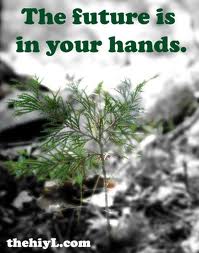- Written by sherlley
- Hits: 4312
Earth Day -April 22
Earth Day was born in 1970, into a world torn by political strife and emboldened by free-spirited activism. The times were a-changin', and an unlikely confluence of people and events led to the first Earth Day celebration on April 22, 1970. But the seed of Earth Day was planted many years earlier, when a handful of scientists and conservationists became aware that the phenomenal post-war growth of American industry -- and its attendant air and water pollution -- was destroying much of the natural world.
The Environmental Movement and Earth Day
In 1962, Rachel Carson, a quiet loner from a Pennsylvania farm who became a renowned biologist and nature writer, published Silent Spring, a jeremiad against the spraying of DDT and other pesticides. By blaming their use for the widespread decimation of bird and animal populations, she is credited for giving the environmental movement its robust scientific underpinnings.
Other events in the 1960s galvanized public awareness of environmental destruction. Air pollution in Los Angeles, New York City and other urban areas had reached such dangerously high levels that human health impacts were immediate and undeniable. Population growth, the impetus for Paul Erlich's seminal 1968 bestseller The Population Bomb, was blamed for bulldozing fields and forests to create sprawling suburbs. And in what may be the most famous eco-disaster of the decade, Ohio's Cuyahoga River, which flowed through Cleveland and other industrial cities, caught fire in 1969 from all the hazardous wastes that were regularly dumped into it.
Gaylord Nelson and the First Earth Day
It was during this era that Senator Gaylord Nelson, a conservation-minded Democrat from Wisconsin, first proposed making environmental protection a national priority. Though in 1963 he convinced President Kennedy to go on a national "conservation tour," little came of it politically. That same year, Nelson introduced legislation to ban DDT: not one single member of Congress joined him. Nelson, undeterred, noticed that a number of small organizations had achieved some success in promoting environmental issues locally. Inspired by these events, and by the growing number of antiwar protests and "teach-ins" that had sprung up across the country, Nelson decided in 1969 that a single day devoted to an environmental teach-in might be the perfect way to put pollution, deforestation and other green issues at the top of the nation's political agenda. Speaking at a conference in Seattle in September of 1969, Nelson proposed that in the spring of 1970 there would be a coast-to-coast grassroots demonstration on behalf of environmental concerns -- and in Nelson's words, "The response was electric. It took off like gangbusters." People across the country had apparently been looking for an outlet to express their growing environmental consciousness. Nelson also took out a full-page ad in The New York Times in January of 1970, announcing that Earth Day would take place on Wednesday, April 22. The date was chosen because of its timing with student class schedules, warmer weather and no competing holidays.
Local Activities for Earth Day
Though Nelson helped to set up an independent organization -- Environmental Teach-In, Inc., led by Denis Hayes, a student activist -- to handle the flood of requests for information, the senator insisted that Earth Day be organized on the local level. This proved to be an inspired idea, as people were far more invested in issues affecting their communities and families.
April 22, 1970, dawned fair and mild, with blue skies throughout most of the country. By most estimates, some 20 million people took to the streets, vastly exceeding even the most optimistic expectations. Republicans, Democrats, school children, college students, labor unions, housewives, doctors, religious leaders, bankers, retirees, farmers and everyone in between participated in thousands of local marches, rallies, parades, protests and other "happenings."
The History of Earth Day Resonates
The first Earth Day was deemed a blazing success. The event was front-page news almost everywhere, and coverage was overwhelmingly positive. The event cemented in people's minds the importance of environmental issues as a community concern and an international political priority. For many participants, Earth Day marked a turning point in their lives, when reckless consumption and unfettered industrial waste suddenly came under harsh scrutiny.
Earth Day has resonated, on a personal and political level, for over 40 years. In months following that first grassroots event, the Endangered Species Act, the Clean Air Act, the Safe Drinking Water Act and dozens of other landmark pieces of legislation were passed. To a remarkable degree, Earth Day institutionalized protection for the land, air and water. And when, in 1990, Earth Day went global as an international event, the world embraced it with the same enthusiasm as Americans did in 1970. For his unceasing devotion to the green movement and other social and environmental causes, Sen. Nelson -- who passed away in 2005 -- was awarded the Presidential Medal of Freedom.
Only when the last tree has died and the last river been poisoned and the last fish been caught will we realize we cannot eat money.— Cree Indian Proverb


.jpg)